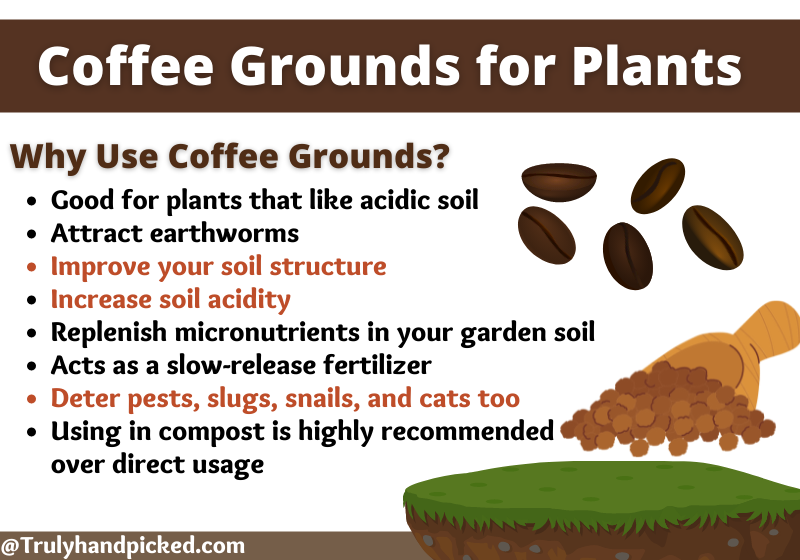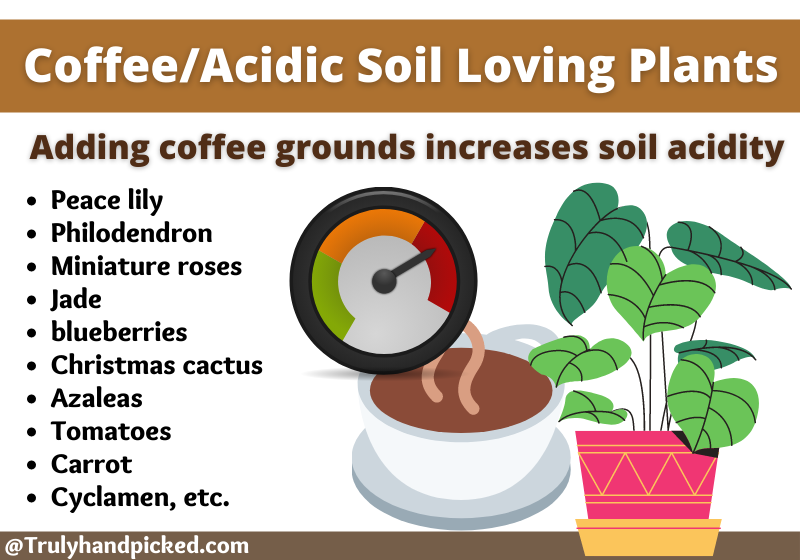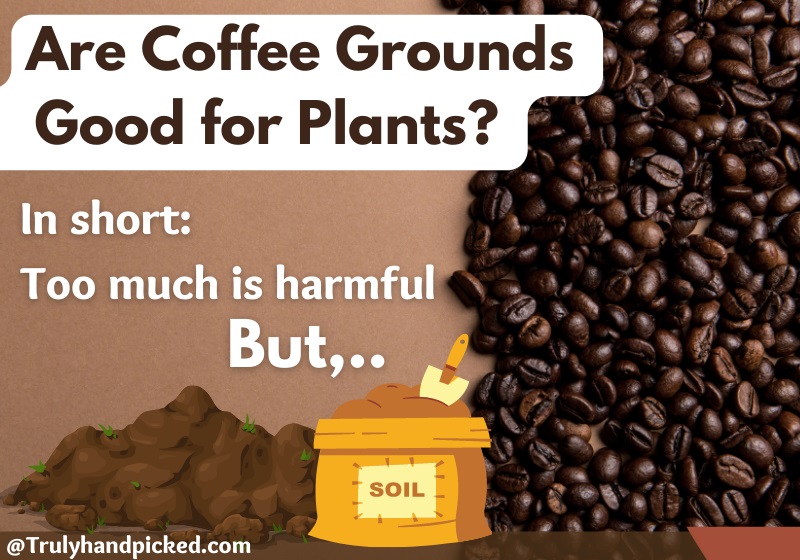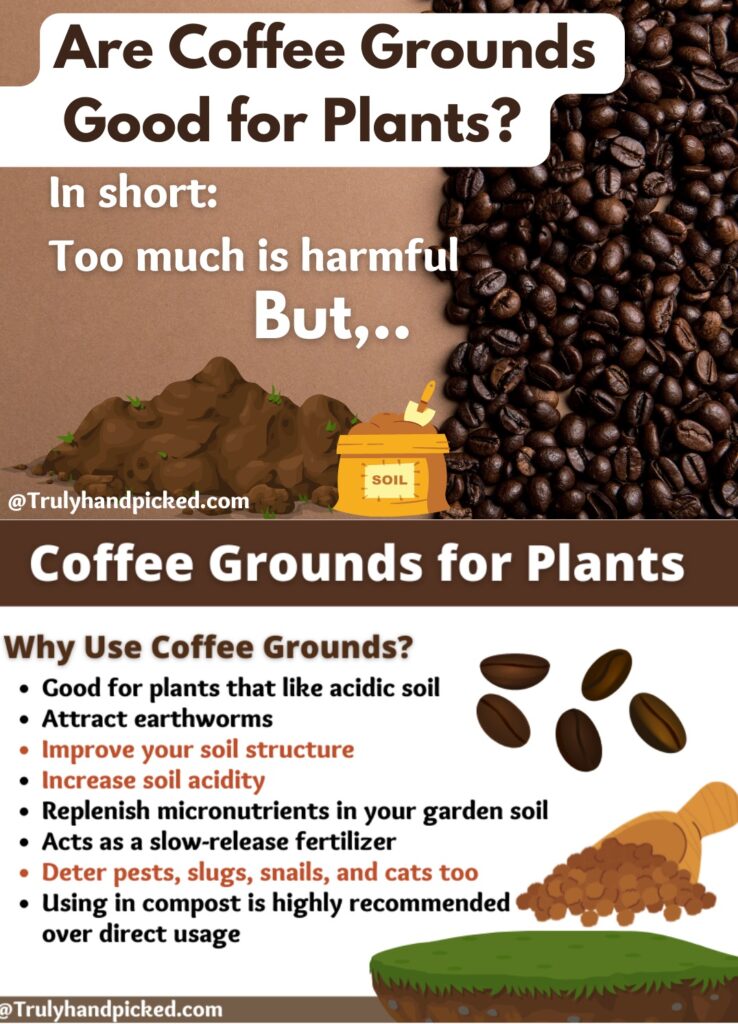Coffee Grounds for Plants: In simple using too much coffee ground can harm your plants, but in ratio, it is good to improve your soil structure and increase soil acidity. So it’s better to use coffee grounds for acidic soil-loving plants.
Along with nitrogen, it helps to replenish micronutrients in your garden soil and is good to attract earthworms. Coffee ground acts as a slow-release fertilizer and it can also be used as a mulch. Moreover, the coffee ground is known to deter pests, slugs, snails, and cats too.
Still, it is recommended to use coffee grounds in compost and apply it to plants as compost or as liquid fertilizer, rather than using it directly.
Coffee Grounds in Garden
A coffee-lover knows how beneficial a cup of coffee can be in regular life, while a smart gardener knows how it can be helpful for garden plants as well.
Once you recognize the goodness of coffee grounds for gardening, you would never throw it away again like other kitchen junks.
Coffee grounds are the powerhouse of natural acid and some essential nutrients. You can use coffee ground in plenty of ways while using it for nourishing your garden plants. Here are some basic utilization ideas you can try with coffee grounds for DIY gardening-

Coffee Ground in Compost:
Coffee ground not only boosts the normal growth of growing plants but speeds up the decomposing procedure as well. There are three apparent advantages you can get from adding coffee ground in your compost bin and they are-
- Faster decomposing experiences
- Totally nourished compost rich in acidic content
- And fully fertile soil with increased nitrogen and potassium value
To include coffee ground in your compost bin, you must follow some rules of using coffee leftovers as great composting material. These are-
- The coffee ground belongs to the green compost part, so, it must be used in liquid form
- Your compost pile must have a balance between ‘green’ and ‘brown’ materials
- So, if you add a high amount of coffee ground in your compost bin, try to add 4x amount of brown compost part too
- The ratio of green and brown compost materials in a compost bin must be 1:4 for the best outcome
- The perfect percentage would be 1 part of coffee ground, 1 part of grass clippings, 1 part of dry leaves, 1 part of straw or twigs, mixed with the additional bacterial component
Give it 4-6 months to decompose well and apply it to fertilize your planting soil with the proper amount.
Apart from the coffee ground you also check ways to add hay or straw in compost.
Coffee Ground as Liquid Fertilizer:
If you don’t prepare compost at home and still want to use the goodness of coffee ground, try using it as a natural fertilizer for your garden plants. Some gardeners, directly sprinkle a handful of dry coffee ground into the soil or at the base of each plant. This way you may steal the other essential nutrients like calcium, iron, phosphorus, magnesium, potassium, chromium, etc. but couldn’t get the nitrogen part from coffee grounds.
So, applying coffee ground in liquid form is the most excellent way to get the best of this product as plant food. Let’s see what is the right procedure to use it as a liquid fertilizer-
- Take a 5-gallon bucket and add a handful of coffee ground into it
- Fill the bucket with water and let coffee ground steep into the water for a couple of days
- Try to keep the bucket in a cool place in your house to let the coffee ground break down more quickly into the water
- After 2-3 days, check the color of the water, and if you find it is perfectly merged with the coffee ground, bring the bucket out of that place
- Strain the water properly and pour it into a watering can for the further usage
- Now, use this water as an organic liquid fertilizer, whenever you need to feed your plant
Coffee Ground to Attract Earth Worms:
One of the most appreciating qualities of using coffee ground in garden soil is, attracting earthworms to your garden more effortlessly. Earthworms can benefit garden soil in plenty of ways, such as-
- Improve the organism of soil
- Increase the important nutrient level of the garden soil
- Boost the growth of your garden plants
- And escalate the soil porosity naturally
You can bring and add some earthworms to your garden manually, but alluring them naturally to your garden would be more beneficial for sure. Using the coffee ground to your garden soil is a great way to invite these earthworms to your garden naturally.
While you add some coffee grounds into your garden soil, it would help in microorganisms, and attract those helpful garden creatures easily to your yard too, as it is a great food for them.
Coffee Ground for Indoor Plants:

Coffee grounds are beneficial for indoor plants too, so, you can use a handful of coffee grounds for your indoor plants as well. There is a wide range of advantages an indoor plant can grab from coffee ground grounds if you know how to apply it properly. Some common benefits of this product on indoor plants are like-
- It could be a great composting material for indoor plants as well
- Work as a natural slow-release and nutritious fertilizer
- Increase the water retaining the quality of the soil of your planter
- Improve the drainage quality of your planting soil
- Protect your plants from the grasp of common pests
- Escalate the soil pH level naturally
Only make sure that your indoor plant is compatible with the coffee ground. Some houseplants do definitely well the usage of coffee ground, while a few may not respond accordingly. You must recognize the nature of your indoor plants first, must be sure whether it would be suitable with the coffee ground or not.
Plants that like acidic soil and coffee ground
- Peace lily
- Philodendron
- Miniature roses
- Jade
- blueberries
- Christmas cactus
- Azaleas
- Cyclamen, etc.
So, if you want to use coffee grounds for your indoor plants, you must be sure about the compatibility and the process of using this product attentively, to steal its goodness only.
Using Fresh Coffee Ground in Garden:
Coffee grounds contain so many beneficial compounds that sometimes you won’t wait for the leftover form of it and love to use its fresh form instantly. Fresh coffee grounds have some other goodness too while used in planting soil. Some of the common benefits of fresh coffee grounds in gardening are-
- Surpass weeds and unwanted wild plants around your garden plants
- Fertilize the soil easily
- Increases the soil acidity level and lift the pH level
- Deter some annoying pests and slugs
- Keep some plant destroyer animals like cats, rabbits at bay
- Be a great mulching option due to its high water-retaining quality
- Improve the drainage quality of your garden soil
- Helps in microorganism advantageous
- And improve the aeration of your planting soil positively
Other Uses in Gardening:
Besides, these obvious benefits, you can get even some more bits of help from coffee grounds while used in your gardening field. Such as-
- Control the fungal infection from planting soil, stems, and even roots
- Aid you in the process of vermiculture
- Help to make your soil more productive or fertile
- Use coffee ground to keep snails and slugs away
- Increase the N-M-K (nitrogen-magnesium-potassium) value of your soil deeply
- And allow your plant to grow in a better circumstance to thrive best
FAQ:
Can Coffee Grounds Harm Plants?
Using too much coffee ground can harm your plants, especially, when you use them directly in planting soil. Besides, using coffee grounds for plants that don’t like high acidic soil, would be damaging for the health of your plants too.
Pinterest Image: Coffee Grounds for Plants

